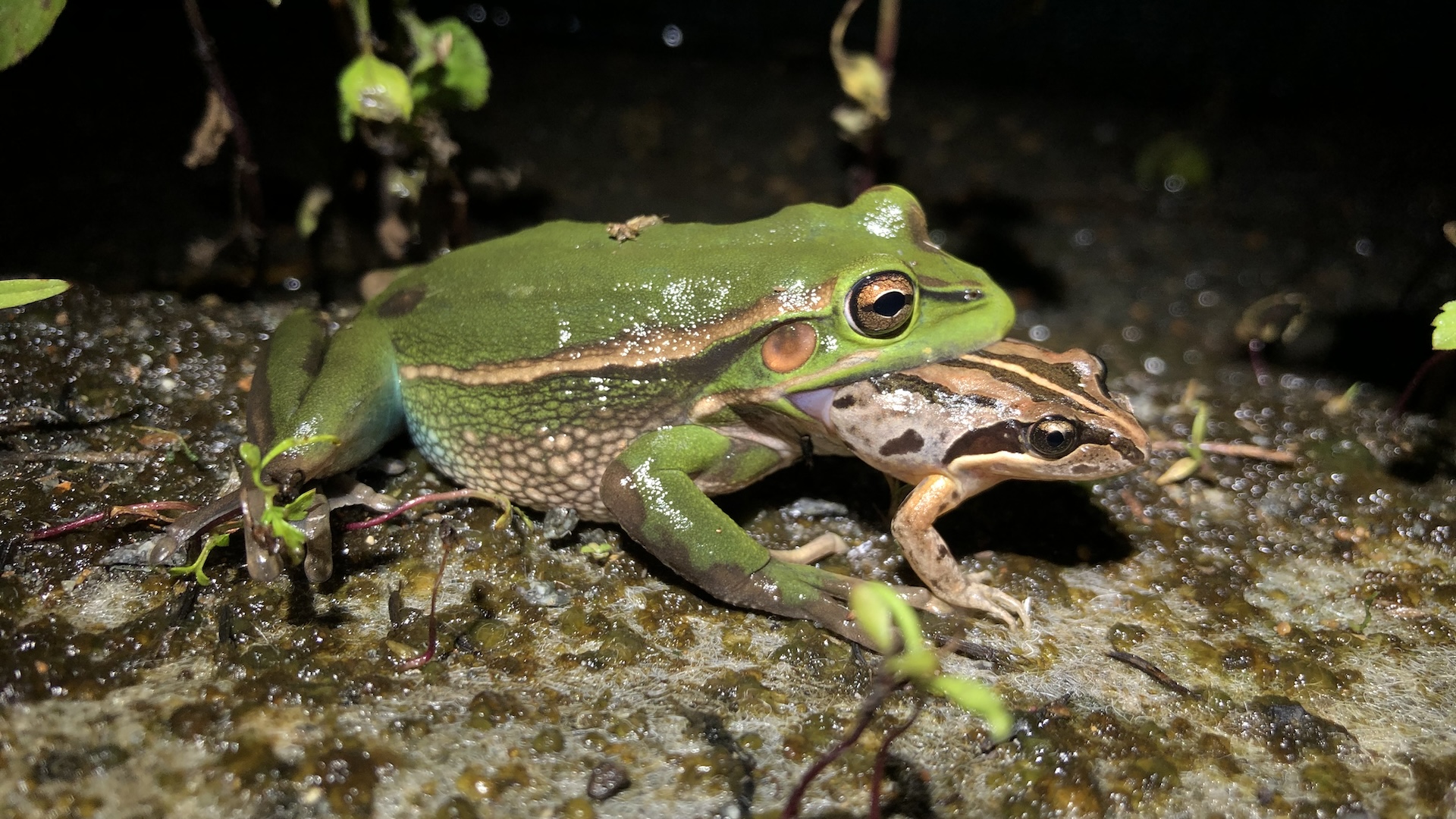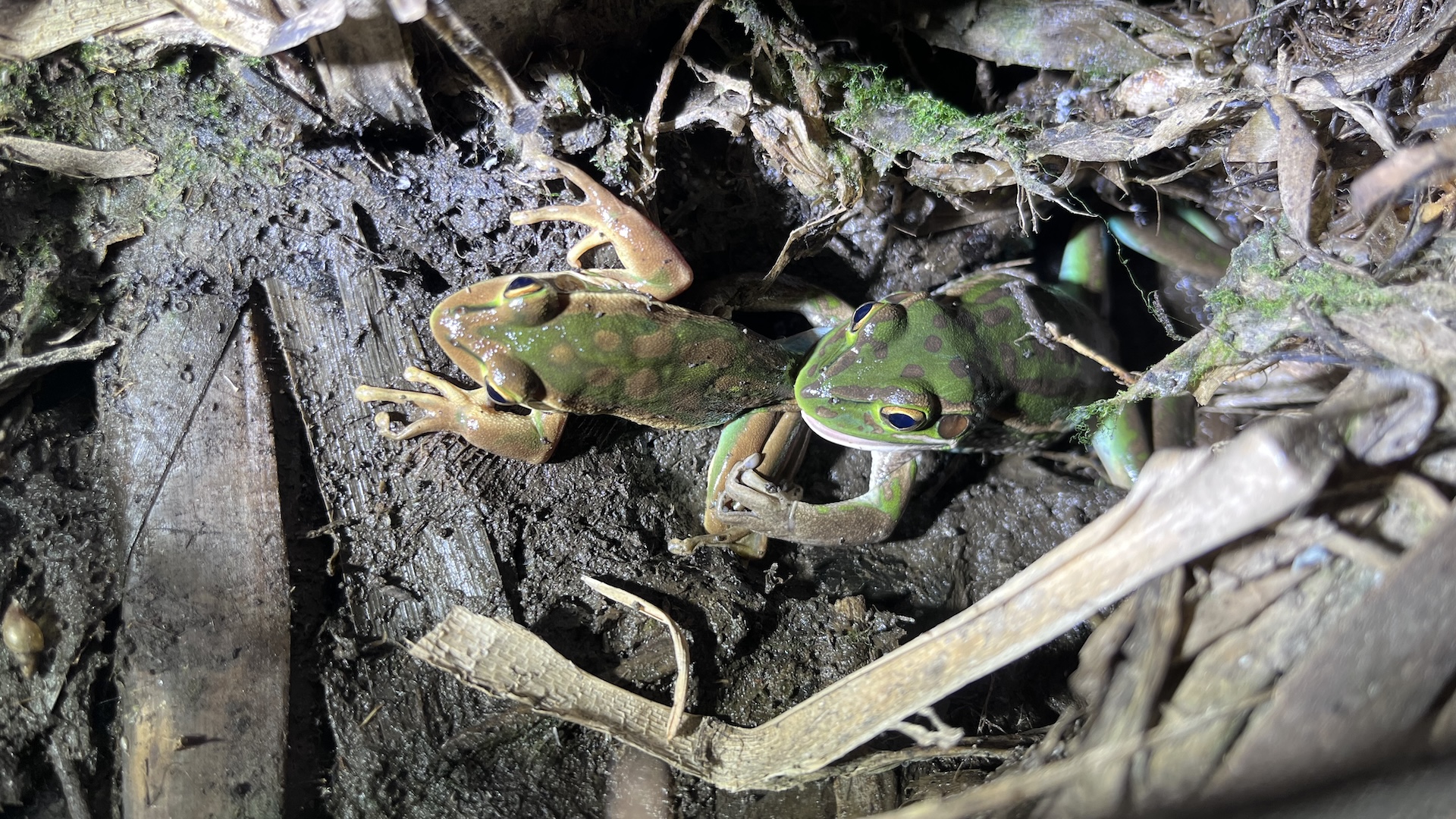'It's risky for male frogs out there': Female frog drags and attempts to eat screaming male
Female green and golden bell frogs in Australia will eat their male counterparts when the males' mating call displeases them.

Breeding seasons can be dangerous for male frogs that attempt to impress a potential mate: They can quickly find themselves being dragged off and eaten by an unimpressed female, researchers have discovered.
For the first time, scientists in Kooragang Island in New South Wales, Australia have observed adult female green and golden bell frogs (Litoria aurea) preying on their male counterparts during breeding season. They detailed their findings in a study published June 12 in the journal Ecology and Evolution.
The researchers first observed this behavior during a survey when they heard a high-pitched squeal.
"You hear it sometimes in the field, and it's often a frog that's being predated upon," study lead author John Gould, a postdoctoral researcher in population ecology at the University of Newcastle, Australia, told Live Science.
After following the screams, Gould discovered the distress noises were coming from a male with its thigh almost completely ingested by a larger female. She was dragging him into a hole by the bank of a pond.
"The male frog really did try to stop this from occurring, so it was grabbing onto anything around it, like sticks in the ground, to stop itself from being dragged in," Gould said.
The male eventually managed to escape. The observation prompted Gould and his team to compare their nocturnal field observations of three consecutive breeding seasons with other studies that reported instances of sexual cannibalism.
Get the world’s most fascinating discoveries delivered straight to your inbox.

Cannibalism is well-documented in amphibians, but most reported cases involve either adults cannibalizing juveniles that were emerging from the water or tadpoles cannibalizing each other, Gould said.
Amphibian cannibalism typically occurs when large numbers of the animals congregate in the same area, such as when tadpoles emerge from eggs, and when there are notable size differences between predator and prey.
Many species of frogs are sexually dimorphic — adult females are often significantly larger than males.
"There’s a very good opportunity that females can exploit their male counterparts, not only as breeding partners, but potentially as prey," Gould said.
The researchers speculated that this cannibalism may act as a natural selection process.
Females may differentiate between potential mates or prey depending on the quality of their calls during breeding season. Larger males with deeper calls may be seen as better breeding partners, leaving smaller, inferior males as potential meals.
However, Gould suggested that the superior mates may not escape predation either. Instead, once females have dumped all their eggs after breeding, they may choose to eat their mate — similar to female praying mantises, which decapitate and eat their mates during or after mating.
"It's risky for male frogs out there. They're calling their little hearts out to find a mate, but they just have to take on this extra risk of maybe being used as prey," Gould said.
Scientists still don't know for sure what influences these cannibalistic behaviors. Observations of sexual cannibalism are rare because they occur quickly. However, this may not mean that they are infrequent, Gould said.
Gould points out that field observations of amplexus — when a male frog mounts a female to fertilize her eggs — are also relatively rare, even though scientists know it is necessary for breeding.
Further research is needed to establish how frequent these cannibalistic events are and how they impact the local populations of green and golden bell frogs, the team said.

Jacklin Kwan is a freelance journalist based in the United Kingdom who primarily covers science and technology stories. She graduated with a master's degree in physics from the University of Manchester, and received a Gold-Standard NCTJ diploma in Multimedia Journalism in 2021. Jacklin has written for Wired UK, Current Affairs and Science for the People.
